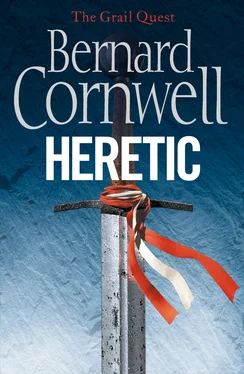The trumpets sounded again and now the grey metallic tide of men-at-arms swept down the slope. They roared their war cry and the sound was rivalled by the drummers who were hammering their taut goatskins and the trumpeters who were playing as if they could defeat the English with sound alone. ‘God and St Denis!’ the King shouted.
The crossbow quarrels were flying now. Each short iron bolt was fitted with leather vanes and they made a hiss as they streaked towards the earthworks. Hundreds of bolts flew, then the Genoese stepped behind the huge shields to work the ratchets that bent back their steel-reinforced bows. Some English arrows thumped into the pavises, but then the archers turned towards Sir Geoffrey’s attack. They put bodkin-headed arrows on their strings, arrows that were tipped with three or four inches of narrow-shafted steel that could pierce mail as if it were linen. They drew and shot, drew and shot, and the arrows thumped into shields and the French closed ranks. One man was pierced in the thigh and stumbled and the men-at-arms flowed around him and closed up again. An English archer, standing to loose his bow, was hit in the shoulder by a crossbow bolt and his arrow flew crazily into the air.
‘ Montjoie St Denis! ’ The men-at-arms bellowed their challenge as the charge reached the flat ground at the foot of the slope. The arrows hammered into shields with sickening force, but the French held their tight formation, shield overlapping shield, and the crossbowmen edged closer to aim at the English archers who were forced to stand high in their trenches to loose their weapons. A bolt went clean through an iron sallet to pierce an English skull. The man toppled sideways, blood spilling down his face. A volley of arrows whipped from the tower’s top and the answering crossbow bolts rattled on the stones as the English men-at-arms, seeing that their arrows had not checked the enemy, stood with unsheathed swords to meet the charge.
‘St George!’ they shouted, then the French attackers were at the first entrenchment and stabbing down at the English beneath them. Some Frenchmen found narrow causeways piercing the trench and they streamed through to attack the defenders from the rear. Archers in the two rearmost trenches had easy targets, but so did the Genoese crossbowmen who stepped from behind their pavises to rain iron on the enemy. Some of the English, sensing the slaughter to come, were leaving their entrenchments to run towards the Ham. Edward de Beaujeu, leading the crossbowmen, saw the fugitives and shouted at the Genoese to drop their crossbows and join the attack. They drew swords or axes and swarmed at the enemy. ‘Kill!’ Edward de Beaujeu shouted. He was mounted on a destrier and, his sword drawn, he spurred the big stallion forward. ‘Kill!’
The Englishmen in the forward trench were doomed. They struggled to protect themselves from the mass of French men-at-arms, but the swords, axes and spears slashed down. Some men tried to yield, but the oriflamme was flying and that meant no prisoners so the French swamped the slick mud at the trench’s bottom with English blood. The defenders from the rearward trenches were all running now, but the handful of French horsemen, those too proud to fight on foot, spurred across the narrow causeways, shoved through their own men-at-arms and screamed the war cry as they drove their big horses into the fugitives beside the river. Stallions wheeled as swords chopped. An archer lost his head beside the river that turned sudden red. A man-at-arms screamed as he was trampled by a destrier, then stabbed with a lance. An English knight held his hands in the air, offering a gauntlet as a token of surrender, and he was ridden down from behind, his spine pierced with a sword, then another horseman cut an axe into his face. ‘Kill them!’ the Duke of Bourbon shouted, his sword wet, ‘kill them all!’ He saw a group of archers escaping towards the bridge and shouted at his followers, ‘With me! With me! Montjoie St Denis !’
The archers, nearly thirty of them, had fled towards the bridge, but when they reached the straggle of reed-thatched houses beside the river they heard the hoofbeats and turned in alarm. For a heartbeat it seemed they would panic again, but one man checked them. ‘Shoot the horses, boys,’ he said, and the bowmen hauled on their cords, loosed, and the white-fledged arrows slammed into the destriers. The Duke of Bourbon’s stallion staggered sideways as two arrows drove through its mail and leather armour, then it fell as another two horses went down, hooves flailing. The other riders instinctively turned away, looking for easier pickings. The Duke’s squire yielded his own horse to his master, then died as a second English volley hissed from the village. The Duke, rather than waste time trying to mount his squire’s horse, lumbered away in his precious plate armour, which had protected him from the arrows. Ahead of him, around the base of Nieulay’s tower, the survivors from the English trenches had formed a shield wall that was now surrounded by vengeful Frenchmen. ‘No prisoners!’ a French knight shouted, ‘no prisoners!’ The Duke called for his men to help him into the saddle.
Two of the Duke’s men-at-arms dismounted to help their master onto the new horse, and just then they heard the thunder of hooves. They turned to see a group of English knights charging from the village. ‘Sweet Jesus!’ The Duke was half in, half out of the saddle, his sword scabbarded, and he began to fall backwards as the men helping him drew their own swords. Where the hell had these English come from? Then his other men-at-arms, desperate to protect their lord, slammed down their visors and turned to meet the challenge. The Duke, sprawling on the turf, heard the clash of armoured horsemen.
The English were the group of men the French King had seen. They had paused in the village to watch the slaughter in the entrenchments and had been about to ride back across the bridge when the Duke of Bourbon’s men had come close. Too close: a challenge that could not be ignored. So the English lord led his household knights in a charge that tore into the Duke of Bourbon’s men. The Frenchmen had not been ready for the attack, and the English came in proper array, knee to knee, and the long ash lances, carried upright as they charged, suddenly dropped to the killing position and tore through mail and leather. The English leader was wearing a blue surcoat slashed with a diagonal white band on which three red stars were blazoned. Yellow lions occupied the blue field that turned suddenly black with enemy blood as he rammed his sword up into the unprotected armpit of a French man-at-arms. The man shook with pain, tried to back-swing his sword, but then another Englishman hammered a mace into his visor that crumpled under the blow and sprang blood from a dozen rents. A hamstrung horse screamed and toppled. ‘Stay close!’ the Englishman in the gaudy surcoat was shouting at his men. ‘Stay close!’ His horse reared up and flailed its hooves at an unhorsed Frenchman. That man went down, helmet and skull crushed by a horseshoe, and then the rider saw the Duke standing helpless beside a horse; he recognized the value of the man’s shining plate armour and so spurred at him. The Duke fended the sword blow with his shield, swung his own blade that jarred on the enemy’s leg armour and suddenly the horseman was gone.
Another Englishman had pulled his leader’s horse away. A mass of French horsemen was coming down the hill. The King had sent them in hope of capturing the English lord and his men, and still more Frenchmen, unable to join the attack on the tower because too many of their fellows were assembling to help kill the garrison’s remnant, were now charging the bridge. ‘Back!’ the English leader called, but the village street and the narrow bridge were blocked by fugitives and threatened by Frenchmen. He could cut his way through, but that would mean killing his own archers and losing some of his knights in the chaotic panic, so instead he looked across the road and saw a path running beside the river. It might lead to the beach, he thought, and there, perhaps, he could turn and ride east to rejoin the English lines.
Читать дальше












